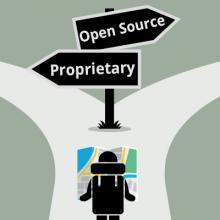Miscellaneous
index, follow




index, follow
For uninformed persons, proprietary CMS, on first view, looks more attractive than Open-source. They think “It is open for everyone, and free, so that product can’t be good. I’ll gladly pay for proprietary software, which is the responsibility of one prominent company. I can't trust Open-source CMS, which code can be modified by everyone.”. So we need to discuss on all advantages and disadvantages of proprietary software and Open-source.
Proprietary CMS can separate source code from executive code, or encrypt source code. The first issue is monopoly, what is the biggest disadvantage of proprietary software. So if you want to terminate the contract, you may not, you must pay for it, or some other issue. Is the owner of a proprietary CMS willing to give you source code of the CMS you were using? That company used the same source code for dozens or hundreds of other clients. So, with that act, will they compromise all other clients? Absolutely not!
From that comes a new issue, when you terminated the contract, how to migrate data to another CMS. Again, is the owner of proprietary CMS willing to give you or assist you in the migration process for competition CMS. If they are willing to assist you, will they do it in the right way, with no bugs, will they admit their mistakes and correct them. They are loosing a customer, will the vendor be fair enough to send him off to their competition with no mistakes?
Also, most proprietary CMS use their own hosting. If you have to change CMS, you will also need to change the hosting provider.
One big benefit of proprietary CMS is that companies who work on their CMS will always quickly respond to client’s requests. But it can’t be so quickly when response is needed by the Open-source community.
One of more possible disadvantages of proprietary software can be less extending possibility. Company who possess such application makes it on principle one-size-fits-all. So extending “core” of proprietary software can be tricky for demanding users. Open-source applications have large communities who test every extending module. So it prevents such issues. But also, Open-source is designed for customization.
Should you rather consider continuing work with the owner of proprietary CMS to avoid listed problems, or to lose all data and start all from the scratch with new CMS?
With Open-source, all is much easier. There is no monopoly, all who know work with Open-source CMS can continue work. It is true, sometimes the community doesn’t give quick support, but hiring a good agency or Drupal developer(s) can avoid slow community responses. For example, Drupal is made on clear programming principles, so there are no unknowns for altering CMS or fixing bugs. If a client wants to migrate to some other CMS, it is much simpler than migrate from proprietary CMS. Because it is open to everyone and usually there are some migration tools between most common CMS software like WordPress to Drupal. Also, if a client wants to change hosting provider, most of those companies do transfer for free if CMS is common.
There is also a big question about which model of CMS is more secure between those two, Open-source and proprietary software.

This question is biased by both sides. We will try to demystify it. Proprietary software has hidden source code and because of that it is more secured from hacking. Only vendor development team has access to source code. But from the other side, disadvantages of proprietary software are that the team is not so large. Upgrades are based on a small group of clients who reporting issues. Open-source applications have a large community who tests and reporting issues. Drupal modules are all free and available to everyone. So, more users mean more testing. But, not all parts of an Open-source application are customizable. For example, it is always forbidden to hack Drupal core.
Open-source and proprietary software have different ways of programming. Programming way of Open-source applications is open for everybody, and it well knew way can be widely learned. For example, from udemy.com or drupalize.me. On the other hand, proprietary software is closed. Programming way can only be learned if the developer works on its vendor. So what if a vendor company stops work because of plenty of reasons. Who will continue work on security and customization of proprietary software. Their developers must be paid for their work. On contrary, Open-source applications have large communities which are constantly in rise. Developers of Open-source software have good reasons to contribute to module extensions, and it is not money:
Those reasons, makes 1.3 millions registered users on Drupal.org, and it's rising.
In this table, we will focus on website Open-source and proprietary software. Advantages and disadvantages of proprietary software and Open-source
| Open-source software | Proprietary software |
Monopoly | No monopoly, because every web developer who knows software can continue working. | User always depends on software owner. If he chooses to change developer, he must migrate the website. But it is very hard process, and again it depends on software owner. |
Quantity of users | Plenty of users tests all parts of software, because of larger community of users. Feedbacks are much more common. | They focus of small user groups, so testing and feedbacks are limited. |
Support | Community sometimes not respond, or not quickly respond to requests. Because it is always free will to someone respond to some issue. So sometimes a developer needs alone to figure out troubleshooting. | Owner of software has responsibility to respond to issue and do some changes. So responses and troubleshooting are required. |
Hosting | Web developer must find proper hosting company. If that case, some expectations may not be fulfilled or can be expensive. | Owner of software usually offers hosting with his software. It sometimes reduces costs and one less concern. |
User skills | User must hire some developer or agency who works with Open-source software. | User can only hire a company who works with proprietary software. |
Security |
|
|
Set up and maintenance | Open-source can be tricky to set up and maintenance. Client often need to hire good developer for that. | There is no setting up by client, because vendor company do it. |
When we, add it all up, advantages and disadvantages of proprietary software and Open-source, the winner is Open-source. eDot.pro is exclusively oriented to Open-source CMS Drupal. It is the best choice for client and for developer, because of more honest relationship and much more other factors. More on this subject.